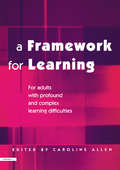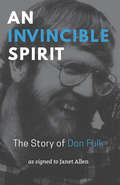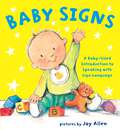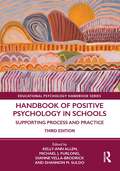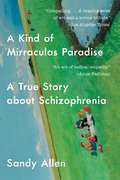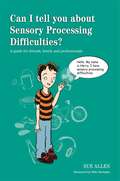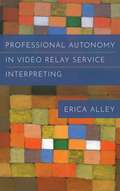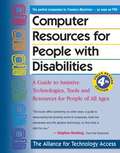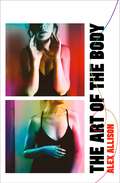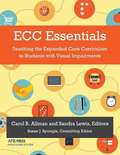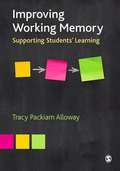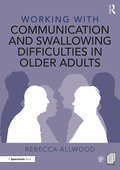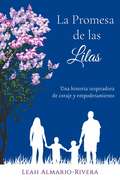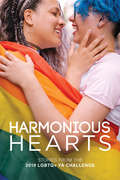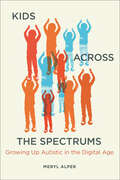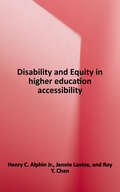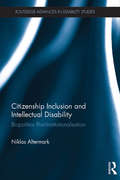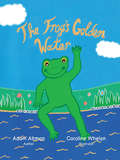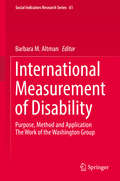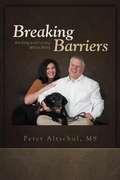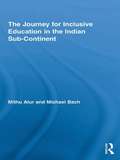- Table View
- List View
A Framework for Learning: For Adults with Profound and Complex Learning Difficulties
by Caroline AllenThis book offers carers, practitioners and managers a tried and tested structure for enabling adults with a range of complex needs to develop their individual skills and experience. It also provides a flexible framework which is suitable for specialist colleges and training centers for people with learning difficulties.
An Invincible Spirit: The Story of Don Fulk
by Janet Allen“Don taught us how to be a real independent living center. Nothing was easy; every issue that came up on the road to Don’s independence was a challenge and a struggle, but the experience pushed us and we learned from it. We were not going to let Don down; all of us were committed to Don’s freedom and independence.” —Kathleen Kleinman, Executive Director, TRPIL (Transitional Paths to Independent Living) Profoundly deafened as an infant, Don Fulk didn’t learn his name or go to school until the age of ten. When he was eighteen years old and a budding superstar on his football and basketball teams, he broke his neck in a swimming accident, and became paralyzed. After his injury, he was confined to a bed in his parents’ home for eight years, unable to move and barely able to communicate. After his family could no longer care for him, he spent nine years in a nursing home where he suffered from abuse and neglect. Yet through a life marred by isolation and frustration, Fulk endured with strength, humor, and grace. He never gave up pursuing his dreams for independence and self-worth, and improving the lives of others. He fought a system that was unfair and discriminatory, and helped pave the way for people with disabilities to live independently. Don Fulk signed his story to author Janet Allen, describing his difficult home life, the incredible friends who changed his life, and his dramatic escape from an abusive nursing home. An Invincible Spirit is a story of hope, empowerment, and the battles people with disabilities have fought—and continue to fight—to improve the quality of their lives.
An Invincible Spirit: The Story of Don Fulk
by Janet Allen“Don taught us how to be a real independent living center. Nothing was easy; every issue that came up on the road to Don’s independence was a challenge and a struggle, but the experience pushed us and we learned from it. We were not going to let Don down; all of us were committed to Don’s freedom and independence.” —Kathleen Kleinman, Executive Director, TRPIL (Transitional Paths to Independent Living) Profoundly deafened as an infant, Don Fulk didn’t learn his name or go to school until the age of ten. When he was eighteen years old and a budding superstar on his football and basketball teams, he broke his neck in a swimming accident, and became paralyzed. After his injury, he was confined to a bed in his parents’ home for eight years, unable to move and barely able to communicate. After his family could no longer care for him, he spent nine years in a nursing home where he suffered from abuse and neglect. Yet through a life marred by isolation and frustration, Fulk endured with strength, humor, and grace. He never gave up pursuing his dreams for independence and self-worth, and improving the lives of others. He fought a system that was unfair and discriminatory, and helped pave the way for people with disabilities to live independently. Don Fulk signed his story to author Janet Allen, describing his difficult home life, the incredible friends who changed his life, and his dramatic escape from an abusive nursing home. An Invincible Spirit is a story of hope, empowerment, and the battles people with disabilities have fought—and continue to fight—to improve the quality of their lives.
Baby Signs: A Baby-Sized Introduction to Speaking with Sign Language
by Joy AllenLong before they're able to talk, babies have a whole lot to say! Widen their world with this delightful modern classic—a must-have for growing families and a perfect baby shower or new-baby gift. With this adorable board book of essential signs, babies and toddlers can easily learn how to communicate their needs, wants, and feelings and even make basic observations with a simple gesture. Studies show that babies who use sign language feel less frustrated, throw fewer tantrums, and often learn to talk more easily. Just point to a sign in the book, say the word while making the sign, and the baby will soon be signing. Communicating a wet diaper or a hungry belly, asking for help or saying "all done" becomes as easy as waving hello or good-bye. And these are just a few of the thirteen signs inside this small and adorably illustrated board book, perfect for little hands and minds to grasp.
Handbook of Positive Psychology in Schools: Supporting Process and Practice (Educational Psychology Handbook)
by Kelly-Ann AllenThe Handbook of Positive Psychology in Schools offers the most current and comprehensive insights into how positive psychology principles provide a framework for young people to become active agents in their own learning. The third edition of this groundbreaking volume assembles the latest global research identifying fundamental assets—hope, optimism, gratitude, self-efficacy, emotional regulation, among others—that support students’ learning and well-being. Chapters examining social-ecological perspectives on classroom quality and school climate provide best practice guidance on schoolwide policies and practices. These 35 new chapters explore positive psychology’s ongoing influence and advances on prevention, intervention, and assessment practices in schools.
A Kind of Mirraculas Paradise: A True Story About Schizophrenia
by Sandra AllenDazzlingly, daringly written, marrying the thoughtful originality of Maggie Nelson's The Argonauts with the revelatory power of Neurotribes and The Spirit Catches You and You Fall Down, this propulsive, stunning book illuminates the experience of living with schizophrenia like never before.Sandra Allen did not know her uncle Bob very well. As a child, she had been told he was “crazy,” that he had spent time in mental hospitals while growing up in Berkeley in the 60s and 70s. But Bob had lived a hermetic life in a remote part of California for longer than she had been alive, and what little she knew of him came from rare family reunions or odd, infrequent phone calls. Then in 2009 Bob mailed her his autobiography. Typewritten in all caps, a stream of error-riddled sentences over sixty, single-spaced pages, the often incomprehensible manuscript proclaimed to be a “true story” about being “labeled a psychotic paranoid schizophrenic,” and arrived with a plea to help him get his story out to the world. In A Kind of Mirraculas Paradise, Allen translates her uncle’s autobiography, artfully creating a gripping coming-of-age story while sticking faithfully to the facts as he shared them. Lacing Bob’s narrative with chapters providing greater contextualization, Allen also shares background information about her family, the culturally explosive time and place of her uncle’s formative years, and the vitally important questions surrounding schizophrenia and mental healthcare in America more broadly. The result is a heartbreaking and sometimes hilarious portrait of a young man striving for stability in his life as well as his mind, and an utterly unique lens into an experience that, to most people, remains unimaginable.
Can I tell you about Sensory Processing Difficulties?: A guide for friends, family and professionals
by Sue Allen Mike MedagliaMeet Harry - a young boy with sensory processing difficulties. Harry invites readers to learn about why he finds it hard to process sensory information effectively, and how even simple thing such as washing, dressing and coping with meal times can be challenging for him. He also talks about difficulties he faces at school and why large groups and loud noises are especially hard. He explains how other people can have different sensory processing issues and talks about what he and those around him can do to help. This illustrated book is ideally suited for readers aged 7 and upwards and occupational therapists, teachers, parents, family members and friends of those with sensory processing difficulties.
Diabetes, Vision Impairment, and Blindness
by Allene R. Van SonVision impairment is a common complication of diabetes mellitus, which is itself the leading cause of new cases of blindness among adults in the United States. Three percent of the country's 10 million diabetics have experienced severe vision loss as a result of the disease. This means that diabetics frequently have to face additional problems of impending loss of vision and blindness. The purpose of this pamphlet is to explain the relationship between visual impairment and diabetes and to identify recent advances in treatment and rehabilitation to help diabetics and their families deal with the problems of vision loss.
Professional Autonomy in Video Relay Service Interpreting (Gallaudet Studies In Interpret #17)
by Erica AlleyVideo relay service (VRS) is a federally funded service that provides telecommunications access for deaf people. It is also a for-profit industry with guidelines that may limit the autonomy of the sign language interpreters who work in VRS settings. In this volume, Erica Alley examines how VRS interpreters, or “Communication Assistants,” exercise professional autonomy despite the constraints that arise from rules and regulations established by federal agencies and corporate entities. Through interviews with VRS interpreters, Alley reveals the balance they must achieve in providing effective customer service while meeting the quantitative measures of success imposed by their employer in a highly structured call center environment. Alley considers the question of how VRS fits into the professional field of interpreting, and discovers that—regardless of the profit-focused mentality of VRS providers—interpreters make decisions with the goal of creating quality customer service experiences for deaf consumers, even if it means “breaking the rules.” Her findings shed light on the decision-making process of interpreters and how their actions are governed by principles of self-care, care for colleagues, and concern for the quality of services provided. Professional Autonomy in Video Relay Service Interpreting is essential reading in interpreter education courses and interpreter training programs.
Computer Resources for People with Disabilities
by Alliance for Technology AccessA resource for people with disabilities who want to improve their lives through the use of technology.
The Art of the Body: A beautiful, unflinching debut about love, loss and intimacy
by Alex Allison'A bold, unflinching debut' GUARDIAN'Brutal, tender, philosophical, visceral, complex and so well written' EMMA JANE UNSWORTHMaintaining one person's dignity comes nearly always at the expense of someone else's. I have learned this for you.Janet is caught between care work and caring for herself. Her life revolves around Sean, a talented fine art student, living and working with cerebral palsy. Both Janet and Sean are new to London and far from their families. Both are finding a means of escape through pushing their bodies to the limit.When Sean is faced with an unexpected and deeply personal tragedy, Janet must let her guard down at last and discover what she's prepared to fight for. The Art of the Body is a novel about dignity and intimacy, tenderness and brutality, unafraid to explore uncommon bodies in unusual ways.'Raw and powerful' IMAGE
ECC Essentials: Teaching The Expanded Core Curriculum To Students With Visual Impairments
by Carol B. AllmanThe book discusses the nine ECC content areas along with relevant assessments, the important roles of teachers of students with visual impairments as well as their students' parents, and learning activities and resources.
Improving Working Memory
by Tracy Packiam AllowayYour working memory is the information your brain stores for a short period of time, it is your brain's post-it note if you like, and how much information you can remember has a huge influence on how well you do at school, and beyond. By understanding a child's working memory, you will be able to support their learning at school, and their concentration. Better working memory can be particularly useful to children with conditions where poor working memory is thought to be an underlying factor. Such conditions include: - dyslexia - dyscalculia - speech and language difficulties - developmental coordination disorders (motor dyspraxia) - ADHD (attention deficit hyperactivity disorder) - autistic spectrum disorders This book explains how to spot problems early, and how to work with children to improve their working memory, therefore increasing their chances of success in the classroom. It also explains the theory behind working memory. Underpinned by rigorous research and written in a highly accessible style, this book will appeal to practitioners, parents and students as an essential guide to helping their students fulfil their maximum potential.
Working with Communication and Swallowing Difficulties in Older Adults (Working With)
by Rebecca AllwoodThis accessible resource offers valuable guidance for all student and practising speech and language therapists (SLTs)who are working with older people with communication and swallowing difficulties. Chapters provide up-to-date theory on age-related changes alongside practical strategies for clinicians to use in their daily work, from help with mental capacity decisions to supporting older people with good palliative care. Promoting a holistic approach for ageing well, this resource dispels myths that surround the ageing process while detailing the normal physiological and psychological effects of ageing on communication and swallowing, as well as diseases and conditions associated with older age, such as frailty. Illustrated throughout with clinical case studies and helpful photocopiable resources to use in practice, this book is a key part of the tool kit for any speech and language therapist working with older adults.
La promesa de las Lilas: Una historia inspiradora de coraje y empoderamiento
by Leah Almario-RiveraEPILOGO De vez en cuando, mis amigos y familia me conectan con alguien que tiene un miembro de la familia diagnosticado con autismo, en caso de que pueda darles una mano u ofrecerles consejos. “¿Qué sugieres que haga? ¿Tienes algunas pautas?” Mi corazón se va con esa familia. ¿Cómo puedo ayudar cuando estoy a miles de kilómetros de ellos? En otros casos me han preguntado, “¿Por qué no trabajas directamente con niños con autismo ya que se beneficiarán de tu conocimiento?” Ojalá pudiera. Especialmente en América del Norte, las familias solo tratan con profesionales certificados en la materia. Mi conocimiento se limita a mi experiencia personal. En la reunión de atletismo del año pasado, un padre que conocía a Gordon desde el jardín de niños vino hacia mí. “¡Mira a tu hijo! Ha pasado por un largo camino.” Le sonreí, y mientras miraba a Gordon de reojo sonreí con mucho orgullo y asentí. Sí, estoy orgullosa de él. “Deberías escribir un libro.” Sugirió el padre. “¿Por qué?” Fruncí el ceño reaccionando a su sugerencia. “Gordon no es un prodigio ni ha desarrollado habilidades extraordinarias atribuidas popularmente a gente con autismo.” “Se han escrito muchas historias sobre éstas personas asombrosas. Pero el universo también está interesado en la historia de Gordon.” Agregó. Reflexioné ante la idea. Es cierto. Mi hijo tal vez no tenga habilidades increíbles, pero su historia puede servir de inspiración. Nunca había pensado en escribir nuestro viaje. Al pasar los años, la incidencia del autismo ha crecido. Cada vez que menciono ‘autismo’, el extraño con el que estoy hablando inmediatamente compartirá su historia sobre alguien que conoce que también está en el espectro (desorden del espectro autista) y se podría beneficiar de mis consejos e historia. Mientras tanto y afortunadamente, una gran dive
Harmonious Hearts 2019 - Stories from the Young Author Challenge (Harmony Ink Press - Young Author Challenge #6)
by Ryan Almroth M. Caldeira M.k. Elford Abigail FitzGibbon Alexis K Henley Rhiannon Lee Alec S. Lefeber Oliver X. Li K. Noel Moore Daniel Okulov Jordan Ori Chloe Smith Gabrielle TaylorFor six years, Harmony Ink has been privileged to showcase the very best up-and-coming writers of LGBTQ+ fiction. We are once again awed and inspired by the talent, creativity, and heart displayed by these authors, all fourteen to twenty-one years old. Selected from dozens of entrants, these young people are the winners of the Harmony Ink Young Author Challenge, and they represent the entire spectrum as well as a variety of fictional genres. They are the future voices of our community, and they invite you to take a journey into their rich and imaginative worlds.
THE MOST ABSURD MYTHS ABOUT DEAFNESS IN WORLD HISTORY
by Regina Alonso Karla M. V.The present study gathered mentions and historical data on the vision of society about deaf people dating back the first mankind reports on the topic. The analysis of the facts accessed several sources, comprising a broad variety of texts, from books and scientific websites to entertainment brochures. The study had as objective and goal the compilation of a material with examples of some of the most absurd myths and mentions ever documented about human deafness, showing the power of creative ignorance and how this can hinder even more the life of people inflicted by hearing impairment. The findings pointed out to some considerations; the most obvious is the power of religious ignorance and ill-conceived interpretations and translations, as well as the people's fear when coming across something they do not understand and, for this reason, they end up not knowing how to react. However, it is necessary to make clear that the authors never had the intention of disrespecting, offending or humiliating the authors of the examples used and their religious beliefs. Ultimately, the present study has the purpose of introducing myths and considerations about deaf people and trying to unveil these myths to elucidate and provide explanations for their correction. It also aims at divulging obtained and analyzed technical data to record them permanently, providing a study and data source to encourage other researchers in the area to develop further studies.
Kids Across the Spectrums: Growing Up Autistic in the Digital Age
by Meryl AlperAn ethnographic study of diverse children on the autism spectrum and the role of media and technology in their everyday lives.In spite of widespread assumptions that young people on the autism spectrum have a &“natural&” attraction to technology—a premise that leads to significant speculation about how media helps or harms them—relatively little research actually exists about their everyday tech use. In Kids Across the Spectrums, Meryl Alper fills this gap with the first book-length ethnography of the digital lives of autistic young people. Based on research with more than sixty neurodivergent children from an array of racial, ethnic, and socioeconomic backgrounds, Kids Across the Spectrums delves into three overlapping areas of their media usage: cultural belonging, social relationships, and physical embodiment. Alper&’s work demonstrates that what autistic youth do with technology is not radically different from their non-autistic peers. However, significant social and health inequalities—including limited recreational programs, unsafe neighborhoods, and challenges obtaining appropriate therapeutic services—spill over into their media habits. With an emphasis on what autistic children bring to media as opposed to what they supposedly lack socially, Alper argues that their relationships do not exist outside of how communication technologies affect sociality, nor beyond the boundaries of stigmatization and society writ large. Finally, she offers practical suggestions for the education, healthcare, and technology sectors to promote equity, inclusion, access, and justice for autistic kids at home, at school, and in their communities.
Disability and Equity in Higher Education Accessibility (Advances In Educational Marketing, Administration, And Leadership Ser.)
by Henry C. Alphin Jennie Lavine Roy Y. ChanEducation is the foundation of almost all successful lives. It is vital that learning opportunities are available on a global scale, regardless of individual disabilities or differences, and to create more inclusive educational practices. Disability and Equity in Higher Education Accessibility is a comprehensive reference source for the latest scholarly material on emerging methods and trends in disseminating knowledge in higher education, despite traditional hindrances. Featuring extensive coverage on relevant topics such as higher education policies, electronic resources, and inclusion barriers, this publication is ideally designed for educators, academics, students, and researchers interested in expanding their knowledge of disability-inclusive global education.
Citizenship Inclusion and Intellectual Disability: Biopolitics Post-Institutionalisation (Routledge Advances in Disability Studies)
by Niklas AltermarkWhat happens when a group traditionally defined as lacking the necessary capacities of citizenship is targeted by government programs that have made ‘citizenship inclusion’ their main goal? Combining theoretical perspectives of political philosophy, social theory, and disability studies, this book untangles the current state of Western intellectual disability politics following the replacement of state institutionalisation by independent and supported living, individual rights, and self-determination. Taking its cue from Foucault’s conception of ‘biopolitics’, denoting the government of the individuals and the totality of the population, its overarching argument is that the ambiguous positioning of people with intellectual disabilities with respect to the ideals of citizenship results in a regime of government that simultaneously includes and excludes people of this group. On the one hand, its members are projected to become ideal-citizens via the cultivation of citizenship capacities. On the other, the right to live independently and by their own choices is curtailed as soon as they are seen as failing with respect to the ideals of reason and rationality. Therefore, coercion, restraints, and paternalism, which were all supposed to end with deinstitutionalisation, are still ingrained in services targeting the group. In equal parts a theoretical work, advancing debates of critical disability theory, social theory, and post-structural philosophy, as well as an empirical engagement with the history of intellectual disability politics and the ways in which present day politics target the group, this book will be of interest to all students and scholars of disability studies, disability politics, and political theory.
I Use a Wheelchair
by AltheaJust because I have to use a wheelchair to get about, does not mean that I am stupid or silly. My legs may not wrk, but my brain works just as well as anyone else's of my age. it makes me mad when people ignore me and tal about me as if I wasn't there. I am there. me and my wheelchair.
The Frog’s Golden Water
by Adam Altman Caroline WhelanSkippy has enjoyed swimming in the pond's golden water his entire life. But now the golden sparkle has disappeared, so Skippy and his friends must find out what happened and return to pond to its former splendor. Come join Skippy on his adventure of discovery in his charming story.
International Measurement of Disability
by Barbara M. AltmanThis volume provides an informed review of the accomplishments of the Washington Group on Disability Statistics (WG) in the provision of international data and statistics on disability. It does so within the context of the UN Convention on the Rights of Persons with Disabilities. The volume includes a description of the development and testing of a short set of questions for Censuses, now used in approximately 29 countries and recommended in the U. N. 's Principles and Recommendations for Population and Housing Censuses: The 2020 Round, which includes disability as a core topic to be collected in censuses. It discusses the experiences of several countries on the use of the WG questions and how this has impacted on national agendas in the area of disability. It follows the development and testing of an extended set of questions for use in national surveys other than censuses and examines the challenges of translation and the importance of generating comparable question sets in different languages and within different cultures. It studies the examination of cognitive testing techniques in a variety of countries, and presents the results of the first round of censuses in 2010 in countries using the six question set. The volume includes discussions of the new development of question modules on a broad range of child disability and functioning, and the environmental contexts of participation that are part of the current work of the WG. In addition, it contains a reflection on the use of the WG's functionality approach to identifying disabilities by humanitarian agencies to identify disabilities in populations of displaced persons. A thoughtful conclusion addresses what the development of cross-nationally comparable data can mean for the improvement of circumstances for all persons with disabilities.
Breaking Barriers: Working and Loving while Blind
by Peter Altschul<P>For some unknown reason, Peter Altschul was born totally blind. He grew up in a working-class town where, with the help of his persistent mother, he broke through barrier after barrier, determined to live a full life. <P>After attending a private school that initially turned him away--simply because he was blind--Peter details how he discovered his gift for music, eventually playing percussion in the orchestra, marching band, and jazz ensemble at Princeton University. <P>But it was only after Peter graduated from college that it became evident he would need a guide dog. Heidi, a Weimaraner with a large repertoire of barks, howls, and grunts, would assist Peter for the next eight years through the halls of New England Conservatory, where he eventually obtained a master's degree in music composition. <P>Peter relays how he blazed a unique professional trail while simultaneously overcoming obstacles; managed his uneasy relationship with music; and embraced his unexpected entrance into an unfamiliar and romantic world. <P>He also provides an unforgettable glimpse into the wonderful ways his five guide dogs supported him on his journey from urban bachelorhood to the light of love. <P>Breaking Barriers shares a compelling account of one man's journey through life as he and each of his specially trained dogs learned to trust each other, ultimately melding into a smooth working team that tackled the world-together.
The Journey for Inclusive Education in the Indian Sub-Continent (Routledge Research in Education)
by Mithu Alur Michael BachDespite national and international commitments to Education for All, and the Millennium Development Goals to assure universal primary education by 2015, over 90% of children with disabilities remain excluded from regular education in countries of the south. This book describes a three decade-long change initiative in India to enable children with disabilities to move from segregation and exclusion to inclusive education, and draws lessons for confronting global exclusion. It examines the barriers to inclusion of children with disabilities in the Indian sub-continent, estimated at 4% of the population, or 40-50 million children, and implications of the systemic failure within a human rights framework. The book concludes with setting this initiative in a broader context of inclusive education development efforts, and identifies lessons it provides for a global development agenda for inclusive education, including the importance of ensuring strategies that are culturally appropriate and context-specific.
